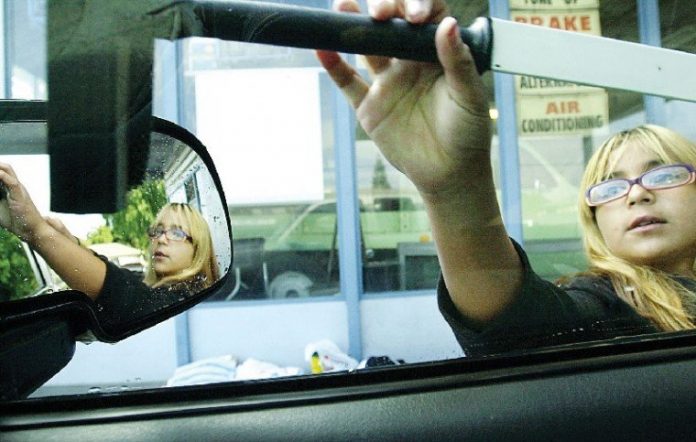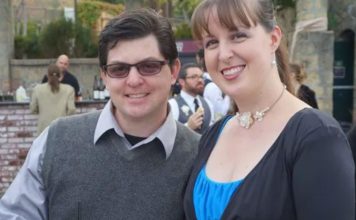A congregation might work for God, but the fire marshall works
for City Hall.
Members of Gilroy’s United Methodist Church found this out last
weekend when acting Deputy Fire Marshall Miguel Trujillo paid them
a visit.
Gilroy – A congregation might work for God, but the fire marshall works for City Hall.
Members of Gilroy’s United Methodist Church found this out last weekend when acting Deputy Fire Marshall Miguel Trujillo paid them a visit. Apparently the group didn’t have a permit for their fund-raising car wash that would’ve siphoned sudsy water into the storm drains and eventually into Monterey Bay.
“That had never entered our minds,” said Charles Krahenbuhl, a retired marriage and family counselor and the church’s former pastor who was helping fellow Methodists with the wash to raise money for a trip to the south Pacific archipelago of Tonga where volunteers will incidentally be digging a well for the islanders.
“Our group is very concerned about the environment, but we just didn’t realize that this water got into the system,” Krahenbuhl said. “From what we have observed, the high school has had car washes at various places for years.”
This may be, but when Gilroy High School cheerleaders wave their pom-poms in front of E Z Clean Car Wash downtown on Monterey Street, they’re used water goes through a filtration system that feeds into sewer pipes.
For anyone who wants to conduct a fund-raiser or wash many cars for whatever reason, they need a permit, and Gilroy Fire Marshal Jacqueline Bretschneider said the city only issues one a month so people can’t continually run a car wash, irritating car-wash businesses that must have “sand-oil interceptors” to ready the tainted water for sanitary sewer treatment.
“The clincher is [tainted] water can’t go into storm drains, and the only way it can go into the sanitary sewer is through an interceptor,” Bretschneider said.
The interceptors are basically huge tanks that work by letting dirt particles settle at the bottom of the water and allowing the oily, soapy elements to rise. The water in the middle flows to a separate, smaller tank before entering the sewer system, and the first tank’s remaining dirt eventually goes to the landfill while the oil’s recycled, according to Bretschneider.
“As long as someone shows us how they’re handling the water, we give them a permit,” Bretschneider said, adding that applicants must also have stop-gaps on their hoses and regulate any traffic build-up resulting from their operation.
Gilroy High School Athletic Director Jack Daley said the school hasn’t held a car wash in years because of the city’s policy.
“We try and discourage student groups from doing car washes here,” Daley said. “There are places you can do it. You just have to be a little more creative.”
If you keep it small and do it right, one place you can wash your own car – but not have a car wash – is your own driveway.
“That’s not something you can regulate,” Bretschneider said. “If nobody complains about them, they’re not going to get investigated.”
The city allows these personal car-washers to dispose bubbly water on their landscape as long as they cover any nearby storm drains. The church could have done this, but it hadn’t even secured a permit, and ensuring that all the water ended up on the landscape would have been difficult at best.
“Soapy water down the storm drain is not the worst thing that can happen in life, which is why we’re not out there searching for every bit of soap that goes down the storm drain,” Bretschneider said, “but it’s part of a bigger issue: preventing pollution from going down the storm drain.”
The permit program is only two years old, according to Bretschneider, and fund-raising car-washes were completely prohibited for the 10 years prior because Bretschneider said people were running impromptu car washes without distributing the water across their landscape or hooking up to an interceptor system, robbing professional car washers of business after they had paid fees and secured an interceptor system.
Despite all the commotion, Krahenbuhl remains unconcerned, as evidenced last Saturday when the church improvised a “dry car wash” after the city shut down the fund-raiser – instead providing interior vacuuming, window cleaning and wheel buffing.
“Methodists are very versatile, you know, we don’t get too excited about these things,” he said. “After all, if you pass a rule, you should abide by it.”
Daley said the whole process “makes it a little bit harder on nonprofits and people trying to raise money,” but he added that it’s “ultimately better for everyone because it’s all of our water.”
Chris Bone covers City Hall for The Dispatch. Reach him at 847-7109.














